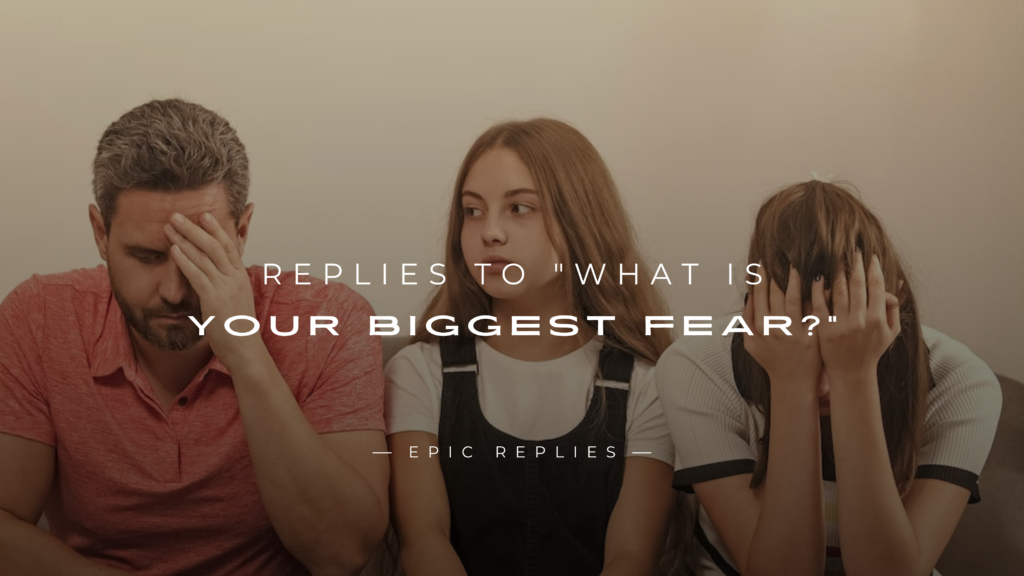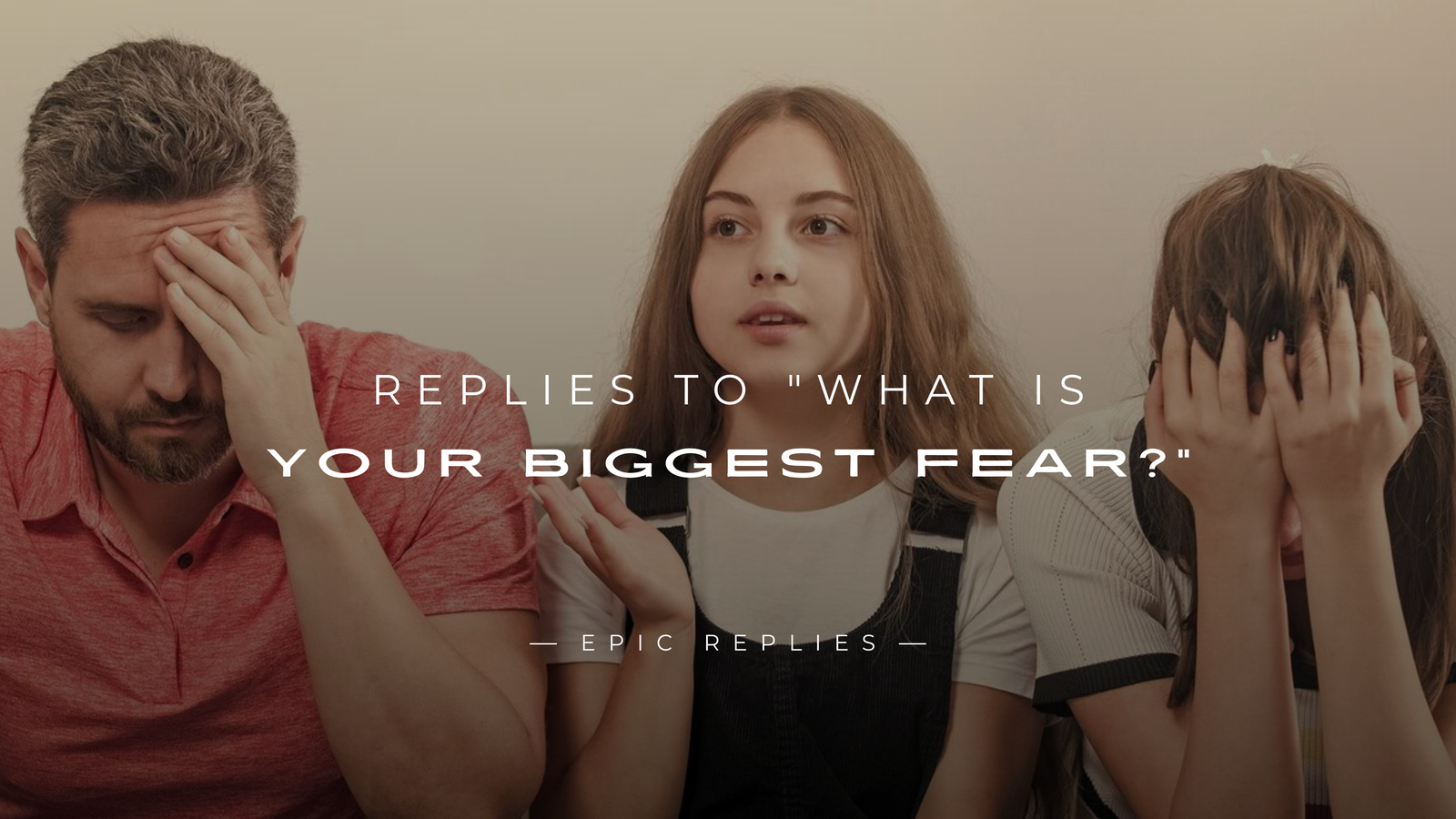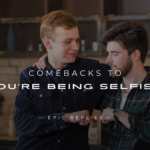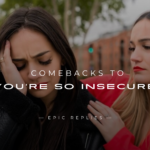You’ve probably been there. Sitting in a job interview, chatting with someone new, or getting deep in conversation with a close friend, and suddenly the question comes up: “What is your biggest fear?” Cue the brain freeze, nervous laugh, or the awkward pause.
This question can feel like a landmine, but it doesn’t have to be. Whether it’s asked in a professional setting, a personal moment, or even during a playful game of “20 Questions,” how you respond can say a lot about your character, values, and emotional awareness. People don’t just want to hear what scares you. They want to see how self-aware, honest, and thoughtful you are.
In this guide, you’ll learn how to answer this question in a way that feels genuine, smart, and appropriate to the moment. You’ll explore what fears say about us, how to reflect on your own, and how to deliver your response with confidence and clarity. Let’s dive into how to make this question your opportunity to shine, not stumble.

250+ Replies to “What Is Your Biggest Fear?”
Fear of Failure
- I’m scared I’ll give something my all and still fall short.
- Failing in front of people I respect terrifies me.
- I constantly feel like one wrong step will ruin everything I’ve worked for.
- I fear not being able to provide for myself or my family.
- The idea of trying and failing is worse to me than not trying at all.
- I worry that I’ll never reach the potential others see in me.
- I’m scared of wasting years chasing something that doesn’t work out.
- I fear being seen as someone who couldn’t make it.
- I doubt myself all the time and it paralyzes me.
- I’m afraid failure would prove I’m not good enough.
Fear of Rejection
- I hold back my feelings because I’m scared they won’t be returned.
- Rejection hits me hard even when it’s something small.
- I’m afraid people will see the real me and walk away.
- I avoid putting myself out there because I can’t handle the “no.”
- I constantly second-guess myself in social situations.
- Being told “you’re not what we’re looking for” feels like a punch.
- I fear not being wanted, even by those who seem to care.
- It’s easier to be alone than to risk being rejected again.
- I overthink every interaction, terrified I said the wrong thing.
- One rejection sticks with me longer than ten compliments.
Fear of Abandonment
- I get anxious when people pull away, even just a little.
- I always feel like people will leave once they get to know me.
- The idea of being left behind out of nowhere really gets to me.
- I’ve been abandoned before, and I still haven’t recovered from it.
- I sometimes push people away first just so they can’t hurt me.
- I need constant reassurance that someone’s not going to walk out.
- Even in good relationships, I’m always bracing for the end.
- I struggle to trust that people will actually stay.
- I fear emotional distance just as much as physical absence.
- The silence after someone disappears is what breaks me.
Fear of Loneliness
- I worry I’ll grow old without anyone truly knowing me.
- Loneliness hits hardest when I’m in a crowd and still feel invisible.
- I dread coming home to an empty room every day.
- I’m scared I’ll never find “my person.”
- I fear dying alone more than dying itself.
- Sometimes I talk to myself just to fill the silence.
- I crave connection but don’t know how to ask for it.
- It’s scary how used to being alone I’ve become.
- I feel like no one would notice if I disappeared.
- I’m afraid that even with people around, I’ll always feel lonely inside.
Fear of Death
- I think about how everything just… ends. That’s what scares me.
- I’m terrified of not existing anymore.
- I worry more about how I’ll die than when.
- Death feels like a huge unknown I’m not ready for.
- The idea of not getting to finish everything I want to do scares me.
- Sometimes I lie awake thinking about what happens after we’re gone.
- I fear losing control in my final moments.
- I’m scared I’ll be forgotten after I die.
- I hate the thought that life just stops one day, no matter what.
- It’s not death itself—it’s leaving behind the people I love.
Fear of the Unknown
- Not knowing what’s coming next keeps me on edge.
- I like control, and the unknown is the exact opposite of that.
- Starting something new without a clear outcome terrifies me.
- I hate surprises—I need to know what’s going on.
- The future feels like a dark room I can’t see into.
- I feel frozen when I don’t have a plan.
- Uncertainty makes me anxious beyond reason.
- I’m scared to move forward without knowing where I’ll land.
- New paths excite some people, but they terrify me.
- I don’t mind risks—I just can’t handle blind ones.
Fear of Change
- Even small changes throw me off completely.
- I get stuck because I’m afraid of what change might bring.
- Change feels like chaos, and I like stability.
- Every time something changes, I feel like I’m losing part of myself.
- I fear I won’t be able to adapt.
- I hold onto routines even when they don’t serve me anymore.
- Change makes me question everything I thought was secure.
- I hate starting over, even if it’s necessary.
- I worry that change means losing people or parts of my life.
- I know growth needs change, but I still resist it.
Fear of Public Speaking
- My voice shakes every time I have to talk in front of people.
- I get nervous just thinking about being the center of attention.
- I blank out the moment all eyes are on me.
- I worry I’ll embarrass myself and never live it down.
- I practice a hundred times and still feel unprepared.
- The idea of everyone judging what I say makes me freeze.
- I feel like I can’t breathe when I’m about to speak.
- I avoid any situation where I might have to present.
- I fear stumbling over my words more than anything.
- Even introductions make me panic inside.
Fear of Being Judged
- I feel like people are always watching and critiquing me.
- I overthink everything I say because I fear being misunderstood.
- I’m scared of looking stupid or out of place.
- I try to be perfect just to avoid judgment.
- I avoid expressing my real opinions to fit in.
- I feel like everyone notices my flaws more than my strengths.
- I dress and act a certain way just to escape criticism.
- The fear of being laughed at keeps me silent.
- I want to be myself, but judgment makes that hard.
- I often replay conversations wondering if I sounded dumb.
Fear of Losing a Loved One
- I think about losing my parents and it crushes me.
- I can’t imagine life without the people closest to me.
- Even the thought of it brings me to tears.
- I feel sick when someone doesn’t answer their phone for too long.
- I try not to get too attached because of this fear.
- I constantly worry something bad will happen to them.
- Losing someone I love is my absolute worst nightmare.
- I don’t think I’d be okay if that ever happened.
- I pray daily just to keep them safe.
- I hug them a little tighter every time we say goodbye.
Fear of Not Being Good Enough
- I constantly feel like I’m not measuring up to what people expect from me.
- No matter what I achieve, I still feel like I’m falling short.
- I always compare myself to others and come up lacking.
- I fear that people will one day see through me and realize I’m not enough.
- I try so hard to prove myself, but deep down, I still feel inadequate.
- I feel like I’ll never be smart, attractive, or successful enough.
- I hate how I need validation just to feel like I’m doing okay.
- I’m afraid that nothing I do will ever really matter.
- I work myself to exhaustion just trying to feel worthy.
- I worry that being me will never be enough for anyone.
Fear of Pain or Suffering
- I’m terrified of experiencing long-term physical pain.
- Emotional pain lingers with me longer than I want to admit.
- I avoid risks because I can’t handle getting hurt again.
- I fear losing control of my body or mind from illness.
- Even the thought of watching someone I love suffer breaks me.
- I don’t think I’m strong enough to endure real pain.
- I panic over the idea of being helpless in a hospital bed.
- I avoid deep feelings because I’m scared of emotional pain.
- I fear trauma returning when I least expect it.
- Pain has changed me before, and I don’t want to go through that again.
Fear of Losing Control
- I hate not being in charge of what’s happening around me.
- Chaos and unpredictability make me feel unsafe.
- I micromanage everything just to avoid surprises.
- I get anxious when things don’t go according to plan.
- I need to know what’s next or I start spiraling.
- The idea of losing control of my emotions scares me.
- I don’t trust others easily because I fear they’ll mess things up.
- I feel like if I’m not in control, everything will fall apart.
- Even relaxing feels wrong because it means letting go.
- I’m scared of situations where I can’t escape or make decisions.
Fear of Success
- I’m scared that success will change how people treat me.
- What if I succeed and then can’t keep up with expectations?
- I fear becoming someone I don’t recognize just to stay ahead.
- Success feels like pressure I’m not ready for.
- I don’t know if I deserve the good things that come with success.
- I sometimes sabotage myself because I’m afraid of what happens next.
- I fear success will isolate me from the people I love.
- What if I achieve everything and still feel empty?
- I don’t want to win just to lose myself in the process.
- Success scares me more than failure because it feels final.
Fear of Intimacy
- I struggle to let people get close to the real me.
- Vulnerability terrifies me because it means I can get hurt.
- I keep emotional distance even in relationships that feel safe.
- I want connection but I push it away when it gets too real.
- I fear that opening up will give someone the power to destroy me.
- I’ve been hurt before, and I never want to feel that again.
- I feel safer when I’m guarded, even if it means being alone.
- I crave love but can’t seem to trust it fully.
- I pretend I’m okay being on my own because letting someone in is too risky.
- I’m scared that the moment I show my true self, they’ll leave.
Fear of Betrayal
- I find it hard to trust because I’ve been lied to before.
- Every time I get close to someone, I worry they’ll stab me in the back.
- I double-check everything people say because I’m afraid it’s a trick.
- I’ve been betrayed before and it still haunts me.
- I fear loving someone who’s just pretending to care.
- I’m always bracing for people to switch up on me.
- I question motives even when I shouldn’t.
- I feel like betrayal is just a matter of time.
- I hate that I expect the worst, even from good people.
- I keep secrets because I don’t want them used against me.
Fear of Mediocrity
- I don’t want to go through life without doing something that matters.
- I’m scared of being just average and forgotten.
- I fear living a life that never stands out.
- I want to make an impact, and the thought of not doing so terrifies me.
- Mediocrity feels like wasting the life I’ve been given.
- I want to be more than just someone who existed.
- I fear waking up at 80 and realizing I didn’t do anything meaningful.
- I can’t stand the idea of being replaceable.
- I want to leave something behind, not just pay bills and die.
- I’m scared of blending into the background forever.
Fear of Wasting Time
- I constantly ask myself if I’m using my time wisely.
- I worry that I’m spending years on the wrong path.
- The idea of looking back with regret scares me.
- I don’t want to waste time on people who aren’t meant to stay.
- I feel pressure to make every minute count.
- I’m scared of putting effort into something that goes nowhere.
- I hate how fast time moves and how little I seem to do with it.
- I fear that I’ll never catch up to where I’m supposed to be.
- I overthink every decision because I don’t want to lose time.
- I feel like I’m running out of time to make something of myself.
Fear of Aging
- I’m scared of losing my energy and health.
- Wrinkles don’t bother me as much as feeling irrelevant does.
- I fear becoming invisible as I get older.
- I worry about being alone when I’m old.
- I hate the thought of not being able to do what I love anymore.
- Getting older reminds me that time is running out.
- I fear that people will stop listening to me as I age.
- I don’t want to become dependent on anyone.
- Watching my body slow down makes me feel vulnerable.
- I’m afraid of waking up one day and realizing life passed me by.
Fear of Losing Identity
- I’m scared I’ll wake up one day and not recognize who I’ve become.
- I feel like I’m always changing to fit in, and I don’t know who I really am anymore.
- I worry that trying to please everyone is slowly erasing the real me.
- I’ve spent so long adapting that I don’t even know what I truly want.
- I’m afraid that if I stop doing what I do, I won’t have a sense of self left.
- The thought of losing my passions makes me feel like I’d lose myself too.
- I don’t want to become just a version of what others expect.
- I feel like I’m being pulled in so many directions, I’m disappearing.
- I’m scared that life circumstances will turn me into someone I never intended to be.
- If I stop fighting for who I am, I’m afraid I’ll just fade into the background.
Fear of Being Trapped
- I get anxious just thinking about being stuck in a life I don’t want.
- I’m terrified of committing to something and then realizing I can’t get out.
- Feeling trapped in a relationship or job makes me feel suffocated.
- I fear losing my freedom more than anything.
- Even routines make me feel boxed in sometimes.
- I hate feeling like I don’t have options or a way out.
- I’m scared of getting comfortable in a situation that actually limits me.
- The idea of being stuck in a place or mindset forever makes me panic.
- I sometimes avoid stability just because I associate it with feeling trapped.
- I worry that I’ll settle for a life I secretly resent.
Fear of the World Ending / Catastrophe
- I sometimes lie awake thinking about the world just collapsing overnight.
- Climate change genuinely keeps me up at night.
- I’m scared we’re heading toward something irreversible.
- I worry about war breaking out and everything changing in an instant.
- The idea of everything we know being wiped out terrifies me.
- I feel helpless watching the world become more chaotic.
- I try to stay hopeful, but it’s hard when disaster seems so close.
- I think about how future generations might not have a planet to live on.
- The instability in the world makes it hard to plan for anything.
- I fear waking up to news that everything has changed for the worse.
Fear of Failure in Parenthood / Family
- I’m scared I won’t be the parent my child needs.
- I worry that I’ll pass on my own fears and flaws to my kids.
- I constantly wonder if I’m doing enough for my family.
- The thought of failing the people who count on me breaks my heart.
- I’m afraid I’ll miss something important and regret it forever.
- I don’t want to be the reason someone I love feels unloved.
- I fear that despite my best efforts, I’ll get it all wrong.
- I feel pressure to be perfect, even though I know that’s not possible.
- I’m scared of being emotionally unavailable the way my parents were.
- I worry every day about how my actions are shaping my children’s future.
Fear of Being Forgotten
- I want to leave something behind that matters.
- I fear living a life that no one remembers.
- I don’t want to be just a name on a list someday.
- The idea that people might not remember me after I’m gone makes me feel invisible now.
- I try to make meaningful connections, but I still feel forgettable.
- I want to be remembered for who I was, not just what I did.
- I worry that when I leave a room, people forget I was even there.
- I’m scared of being just another face in a crowd.
- I try to leave an impact because I fear being erased from memory.
- I’m afraid that once I’m gone, it’ll be like I never existed at all.
Fear of Fear Itself
- I get anxious just thinking about feeling anxious again.
- Fear has stopped me more than failure ever has.
- I avoid things not because they’re hard, but because I’m scared of how I’ll feel.
- I fear the spiral of fear more than the thing I’m afraid of.
- I sometimes get scared without knowing why, and that’s the worst part.
- Fear makes me freeze, and I hate how powerless it makes me feel.
- I’m afraid of getting stuck in my own head.
- The anticipation of fear is worse than the actual experience.
- I try to stay calm, but the fear of losing control makes it worse.
- I live cautiously because I’m scared of fear taking over.
Understanding the Purpose Behind the Question
- In Job Interviews
When interviewers ask what your biggest fear is, they are not looking for an emotional confession. They are actually looking to evaluate your self-awareness and how you respond to challenges. They want to know if you understand your own limitations and what you’re doing to overcome them. For example, if you say you fear public speaking but have taken steps to improve, that shows initiative and growth. Employers are interested in people who are honest about their flaws and proactive in addressing them.
- In Personal Conversations
Friends, partners, and even acquaintances might ask this question out of genuine curiosity. It can be a conversation starter or a way to connect on a deeper emotional level. When you open up about something personal, like a fear of failure or fear of being alone, it invites the other person to share too. It builds trust and strengthens the bond.
- In Therapy or Coaching Sessions
In these settings, the question is more than casual. It is a tool for growth. Therapists ask it to uncover unresolved emotions, trauma, or belief systems that might be limiting you. Coaches might ask it to identify what is holding you back from taking action or achieving a goal. Here, the fear is not just a fact about you. It becomes a path to healing or self-improvement.
The Psychology of Fear
- Why Everyone Has Fears
Fear is not just natural. It is necessary. Our brains are wired to detect threats and react accordingly. In prehistoric times, fear kept humans alive by alerting them to danger like predators or hostile environments. Today, most of us are not running from wild animals, but we still feel fear in situations that threaten our self-worth, our relationships, or our livelihood. The fear of failure, rejection, embarrassment, or even success is part of the modern human experience. Nobody is immune to it.
- How Sharing Fears Builds Connection
When you share your fears with someone, you are essentially saying, “I trust you with something real.” That vulnerability is powerful. It makes you more relatable and more human. Instead of pretending to have it all together, you let people see the real you. And often, that honesty draws others closer because they realize they are not alone in their own fears.
How to Reflect on Your Biggest Fear
- Digging Deeper Surface vs. Core Fears
Not all fears live on the same level. Some are surface-level fears, while others go much deeper. Surface fears are often specific and situational, like being afraid of dogs or spiders. Core fears are tied to your identity, values, or life experiences. These are the fears that shape how you think, behave, and interact with others.
- Examples of Surface Fears
Fear of flying
Fear of heights
Fear of being in crowded places
Fear of insects or snakes
Fear of speaking in front of groups
These are real fears but usually manageable and often don’t have a lasting effect on your personal development.
- Examples of Core Fears
Fear of failure
Fear of not being good enough
Fear of being alone or unloved
Fear of being judged
Fear of losing control
These are fears that often stem from childhood, trauma, or negative experiences. They tend to influence your choices, your relationships, and even your career.
- Journaling or Meditating to Discover Fears
If you’re not sure what your biggest fear is, spend some time with yourself. Journaling is a fantastic way to explore your thoughts without filters. Ask yourself questions like, “What am I afraid of failing at?” or “What situations make me feel small or insecure?” Don’t worry about grammar or structure. Just write. Often, the truth will come pouring out once you get going.
Meditation works well too. Sit quietly, focus on your breathing, and allow your thoughts to flow without judgment. When a fear surfaces, gently explore it. Where does it come from? What memory is attached to it? The goal is not to solve the fear in one sitting, but to understand it better.
Tips to Frame Your Answer Effectively
- Be Honest but Strategic
You want to be truthful, but also mindful of context. If you are in a job interview, avoid fears that could make you seem unfit for the role. For example, saying you’re terrified of deadlines in a high-pressure role is probably not ideal. Instead, choose a fear that you’ve worked on or are actively improving.
- Show Growth or Insight
The best answers include a story of progress. If you say your biggest fear is public speaking, follow it up with how you’ve taken steps to overcome it. Maybe you joined a local speaking group or practiced with friends. This not only shows honesty but also self-improvement and resilience.
- Avoid Red Flag Responses
There are some answers that raise more questions than they answer. Saying you fear confrontation, leadership, or taking responsibility might be honest, but it can send the wrong message in professional settings. Also, avoid giving a vague or philosophical response like “I fear fear itself.” That might sound deep, but it comes across as evasive.
Good Examples of How to Answer
- For Job Interviews
“My biggest fear used to be public speaking. I remember dreading team meetings and feeling sick before giving presentations. But I recognized it was holding me back, so I joined a Toastmasters group and started practicing regularly. Now, while I still get nervous sometimes, I’ve learned to channel that energy into enthusiasm and clarity.”
- For Personal Conversations
“I think my biggest fear is losing the people I care about. It’s not something I think about all the time, but it definitely makes me more present in my relationships and reminds me to appreciate the people I love.”
- For Vulnerable or Emotional Moments
“My biggest fear is not living a life that feels meaningful. I’m scared of looking back and realizing I never pursued the things I truly cared about. That fear pushes me to take chances and prioritize what really matters.”
Mistakes to Avoid When Answering
- Over-sharing or Trauma Dumping
While honesty is important, you don’t need to reveal something deeply traumatic to be authentic. Sharing too much, too soon can make the other person uncomfortable, especially in casual or professional situations. Keep it balanced.
- Saying “Nothing Scares Me”
This might sound confident, but it usually comes off as dishonest or emotionally closed off. Everyone fears something. Admitting it makes you relatable, not weak.
- Being Too Vague or Generic
If your answer is too broad like “I fear failure” without any context, it doesn’t tell the listener much. Instead, explain why that fear matters to you and how it shows up in your life.
How to Keep It Professional Yet Relatable
- Balancing Authenticity and Boundaries
You don’t have to tell your life story, but you do want to share something real. The best approach is to be emotionally honest without going into personal territory that feels too raw or private. Think about your audience and what they need to hear from you.
Customizing Your Answer Based on the Situation
- Casual vs. Formal Settings
In a casual setting, feel free to be playful or quirky. Something like, “Honestly, I have a weird fear of fish swimming near me in the ocean. No idea why, but it freaks me out.” That kind of answer is light, real, and usually sparks laughter or curiosity.
In a formal setting like an interview or panel discussion, stick with something more insightful that also speaks to your character, such as your fear of missing deadlines or not living up to your potential.
- One-on-One vs. Group Settings
If you’re one-on-one with someone, you can get a little more personal or introspective. In group settings, especially if you don’t know everyone well, it’s better to keep it general and safe while still being genuine.
Why Vulnerability Can Be a Strength
- Letting Others See the Real You
When you’re willing to open up about your fears, you invite others to do the same. That creates a space where people can be real, and that’s where genuine connection happens.
- Gaining Respect Through Openness
Contrary to what some might think, showing vulnerability often earns you respect. It demonstrates emotional maturity and confidence. People trust those who are honest about their limitations and aren’t afraid to say, “I’m working on this.”
When to Be Playful with Your Answer
- Humor in Light Conversations
If someone casually asks, “What is your biggest fear?” at a dinner party or social event, you can absolutely lean into humor. Try something like, “Running out of Wi-Fi during a long flight. Terrifying, right?”
- Light-Hearted but Honest Answers
Even if you are being playful, you can still give an answer that reflects who you are. “I’m terrified of karaoke, but I’m always the first to sign up. I figure facing your fears should be fun.”
Practicing Your Answer
- Role-playing or Mirror Practice
Try saying your answer out loud in front of a mirror or while talking with a friend. This helps you feel more comfortable and lets you refine your delivery. You’ll also notice if anything sounds awkward or forced.
- Getting Feedback from Friends or Coaches
If you have a mentor, coach, or trusted friend, ask them to listen to your answer. Get their feedback on what works, what feels authentic, and what might need tweaking.
Sample Answers Using the Focus Keyword
Here are a few polished examples that include the focus keyword “What is your biggest fear?”
“What is your biggest fear? I would say my fear is staying in my comfort zone too long. Growth comes from challenges, and the thought of missing out on my potential is something that keeps me striving to improve.”
“What is your biggest fear? Honestly, it’s the idea of being forgotten or not making a meaningful impact. It drives me to be intentional with my actions and build lasting relationships.”
“What is your biggest fear? I think it’s letting people down, especially those who count on me. It’s why I try to be reliable and show up fully in everything I commit to.”
Summary Crafting the Perfect Reply
When it comes to answering “What is your biggest fear?”, remember that it’s not about confessing your deepest secret or impressing someone with a rehearsed script. It’s about being honest, emotionally aware, and intentional with your response. Choose a fear that reflects who you are, share what it means to you, and if possible, show how you’re addressing it. Whether you’re in a job interview or joking with friends, your answer can build connection, show strength, and reveal depth.
Conclusion
Fears are more than fleeting thoughts they reveal our deepest insecurities, motivations, and humanity. The replies shared in this blog offer a powerful glimpse into what people hold closest to their hearts and what keeps them up at night. Whether you’re looking to deepen your connections, start meaningful conversations, or simply explore your own emotions, these fears resonate because they are real, raw, and relatable. If you found this list insightful, you might also appreciate our collection of 250+ Best Replies to “You Don’t Love Me Anymore” for even more emotionally charged responses.
FAQs
Q. What if I don’t want to share my fear?
That is completely okay. You can keep things light or say something like, “That’s something I’m still figuring out.” No rule says you have to share something personal if it doesn’t feel right.
Q. Can I say something funny instead?
Absolutely. Humor is a great way to answer the question in a casual or playful setting. Just make sure it still gives a glimpse of your personality.
Q. How do I turn a negative fear into a positive answer?
Frame it as something that motivates you to grow. For example, “I fear failure, but that fear pushes me to work hard and prepare thoroughly.”
Q. Is it okay to say something generic?
It’s okay to start with a common fear, but you should personalize it. Add context or a story that makes your answer stand out.
Q. What if I freeze when asked the question?
Take a moment, breathe, and say, “That’s a great question. Let me think for a second.” It shows you are thoughtful, not unprepared.










